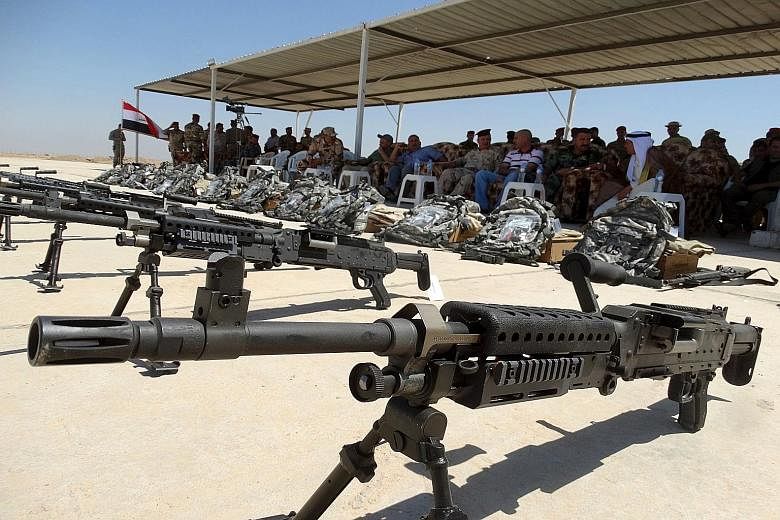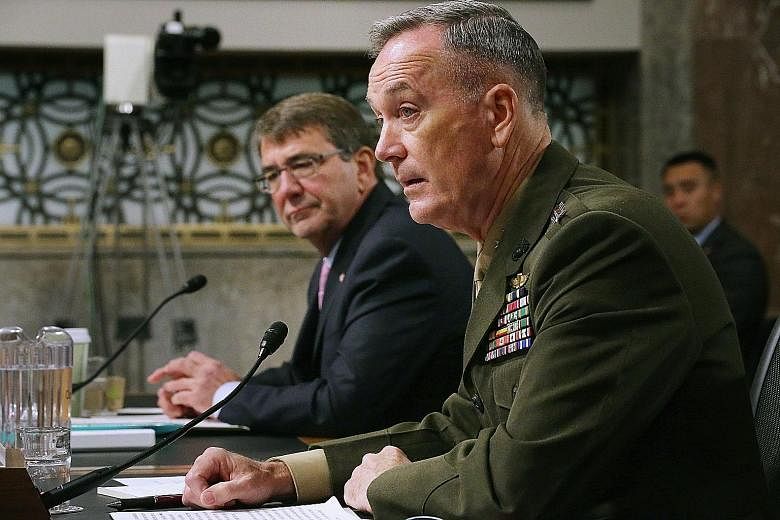WASHINGTON • The United States will ramp up attacks on Islamic State in Iraq and Syria (ISIS) militants in both Syria and Iraq, with additional air strikes and even direct action on the ground.
Testifying before the Senate Armed Services Committee on Tuesday, US Defence Secretary Ashton Carter said he expects more actions like the one last week that freed dozens of captives but left an American commando dead in Iraq.
Additional raids and a focus on Raqqa are two components of an anti-ISIS strategy Mr Carter described as being centred on the "three Rs" - raids, Raqqa and Ramadi.
He explained that, going forward, the US-led coalition would support local forces as they put pressure on ISIS in the group's Syrian stronghold of Raqqa and in the captured Iraqi city of Ramadi.
"We won't hold back from supporting capable partners in opportunistic attacks against ISIL or conducting such missions directly, whether by strikes from the air or direct action on the ground," he said, using an alternative acronym for ISIS.
-
The new 3R strategy
-
The new US strategy against ISIS can be described as the three Rs, says Secretary of Defence Ash Carter.
Raqqa. The de facto capital of ISIS' so-called caliphate is in north-eastern Syria. US-backed Kurdish forces have made major advances in the area. By reorienting air strikes and weapons drops, the US hopes the Kurds will encircle the city and retake it.
Ramadi. The capital of western Anbar province was taken by ISIS in May. Retaking it is an Iraqi government priority, rather than the US' previous choice of Mosul.
Iraqi forces' progress in Anbar province has slowed down. Stepped-up US air strikes and logistical support are meant to help turn the tide.
Raids. These signal that the US will not hold back from opportunistic attacks against ISIS itself or by supporting partners, whether by air strikes or direct ground action.
Experts say much intelligence is gained in raids, which may also free fighters who become strong opponents of ISIS.
SOURCE: VOX WORLD
The Pentagon chief, who faced withering criticism over the administration's handling of the ISIS crisis, said while the Iraq mission was to train, advise and assist Iraqi forces, "where we have actionable intelligence and a capable partner force, we want to support our partners and we will" .
As Mr Carter briefed the committee on the US strategy against the militants, Secretary of State John Kerry spoke with the Senate Foreign Relations Committee behind closed doors on the same issue, just days before heading to Vienna for multilateral talks on Syria tomorrow.
Mr Kerry had felt "optimistic" after talks last week with Russia, Turkey and Saudi Arabia that "pro-gress was being made towards laying down the foundation of what a political transition could look like", State Department spokesman John Kirby said.
"He felt it was important to continue that momentum," Mr Kirby said.
"Friday obviously will be an important day," said Senator Bob Corker, the Republican chairman of the foreign relations panel. The Obama administration is "putting a lot of stock in Friday's meetings", he said.
The Obama administration has not committed ground forces to back opposition and Kurdish rebels fighting the ISIS in Syria, but has 3,500 troops in Iraq. These troops have a "train and advise" role to help Iraqi forces battling the extremists but were recently drawn into fighting in northern Iraq.
Mr Carter said the United States was now supporting Syrian Arab forces already inside the country fighting ISIS rather than trying to train completely new moderate Syrian fighters outside the country, an effort that cost millions of dollars and produced few trained troops.
Marine Corps General Joseph Dunford Jr, chairman of the Joint Chiefs of Staff, told the panel he would consider recommending putting more US advisers with Iraqi troops if it improved chances of defeating the ISIS militants.
"If it had operational or strategic impact and we could reinforce success, that would be the basic framework within which I'd make a re-commendation for additional forces to be co-located with Iraqi units," he said.
Senator John McCain, chairman of the Senate Armed Services Committee, said the administration had "all too often made the problem worse" by trying to deal with symptoms rather than the sectarian divisions at the centre of the problem.
"There's a clear military dimension to this problem," he said. "Unless the military balance of power changes on the ground, diplomacy, as has been amply proven, will achieve nothing."
REUTERS, AGENCE FRANCE-PRESSE


